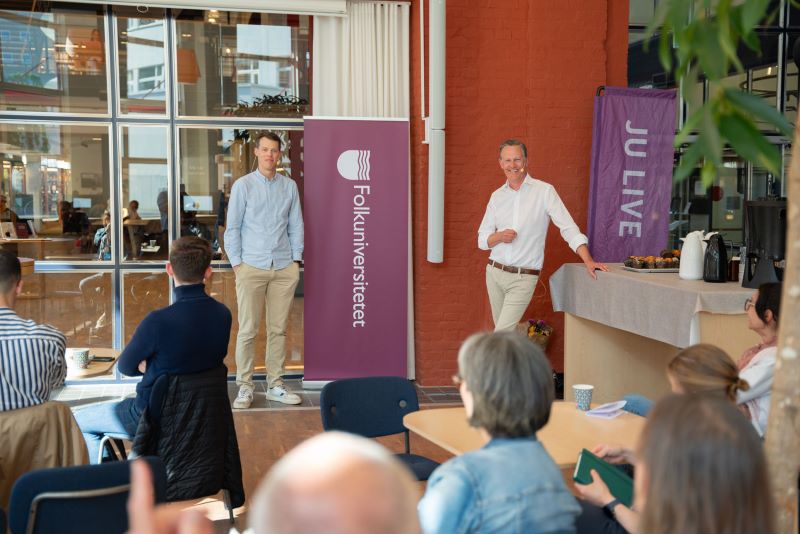Navigating the Swedish pension system

How is the Swedish pension system doing, and what is the best way for savers to navigate the opportunities and alternative solutions? Johannes Hagen, Associate Professor of Economics at Jönköping International Business School (JIBS), Jönköping University, is an expert on the Swedish pension system. Together with Staffan Ström, pension economist at the occupational pension company Alecta, he concluded this year's JU LIVE series.
.jpg)
"JU Live helps make research conducted at JU accessible to the public. It also serves as a meeting place," says Johannes Hagen.
On Thursday, 23 May, it was time for the final session of this year's popular lecture series JU LIVE, organized at Jönköping University in collaboration with Folkuniversitetet. For an hour, the audience learned about the challenges and opportunities within the Swedish pension system and received plenty of good advice on how to make wise choices on an individual level.
"Do you know enough to understand how your decisions affect your future pension?" asked Johannes Hagen at the start of his lecture. Several people in the audience awkwardly shifted in their seats, but they don’t have to feel alone in their ignorance.
When the same question was posed to the Swedish public in a survey, two-thirds answered “no”. The reason for not being sufficiently informed was that they found it too complicated, had simply not gotten around to it, or thought, "I'll do it later."
During the lecture, it became clear that there is much one can do to influence the pension, but it is also perfectly fine to be passive—if you keep track of your passive choices and log in to minPension.se now and then to get an overview of your pensions and how they are accumulating.
"Pension is determined by all the income you pay taxes on throughout your life, and you can choose to withdraw your pension in many different ways, for example, over five years or for life. More than half choose the shorter options. But as life expectancy increases and we stay active for longer, you should think twice before withdrawing your pension too quickly. What happens after 70 if you choose to withdraw all your pension over five years?" says Johannes Hagen.
"I use the 5-2 method – I take five days off and work two"
The so-called 65-year norm is also starting to dissolve. Today, around 40 per cent withdraw their pension before the age of 65, but the number of people who wait to withdraw their pension until much later is also increasing significantly. Not least, the proportion of "jobbonärer"—those who choose to combine work with retirement—is rising.
"Over 416,000 Swedes over 65 years old have some form of employment income, and two out of ten 75-year-olds still work to some extent. And the reason is not primarily financial, although it naturally leads to increased work and pension income to be a ‘jobbonär’," says Staffan Ström.
According to a survey conducted by Alecta, quality of life is instead the most important argument. People choose to continue working simply because it is good for their health, they enjoy their work, do not want to be idle, or for social interaction.
"A female jobbonär told me, 'I use the 5-2 method. I used to work five days and take two off, now I've reversed it',” says Staffan Ström.
I've reversed it',” says Staffan Ström.
What does the financial status for Swedish pensioners look like?
Alecta conducts an annual study on the finances of pensioners, based on actual income data for all three million Swedes over 55 years old. Considering the public debate about ‘poor pensioners’, the results might be surprising. Almost every other Swede has a higher income when they retire, and at 72, three out of ten Swedes still have a higher income than when they were 60. Incomes also increase with each cohort, adjusted for today's money value. Today's 67-year-old has 38 per cent more per year to spend compared to a 67-year-old twelve years ago.
"Our study shows that the average Swede's income after tax at 67 years old is 90 per cent of the income they had at 60. For those who were low-income earners in their sixties, the figure is as high as 116 per cent. Sure, there are older people with really low incomes, but poverty is more common among the young and middle-aged than among the elderly," says Staffan Ström.
Simpler in the past – but not better
Johannes Hagen's tips for retirement:
Keep an eye on the increasing retirement age.
Do not withdraw your pension too quickly.
Plan together as a household.
Both Johannes Hagen and Staffan Ström have a positive view on Swedish pensions. Johannes believes it is a stable system that has so far delivered good and fair pensions. The public pension has decreased in significance for total income as occupational pensions have become an increasingly important part of pensioners' income. In short—it was simpler in the past, but not better.
"If I were to predict how it will look ten years ahead, I think that increased retirement ages will lead to more people withdrawing their public pension later. The trend towards later retirement is also likely to continue. Withdrawals will become more individualized as younger generations, who have both more flexible pension agreements and greater experience with digital tools, retire. The line between working life and retirement will continue to blur. And I think the option to withdraw over five years will be restricted in some way to protect those who may not think long-term," says Johannes Hagen.
The lecture was appreciated and inspiring, as seen from the audience's questions. Pensions concern us all, and many likely felt much more informed when they left this year's final JU LIVE than when they arrived.
JU LIVE is now taking a summer break, but everyone is most welcome to a new and exciting lecture series in the autumn. Keep an eye on JU's calendar so you don't miss anything.

